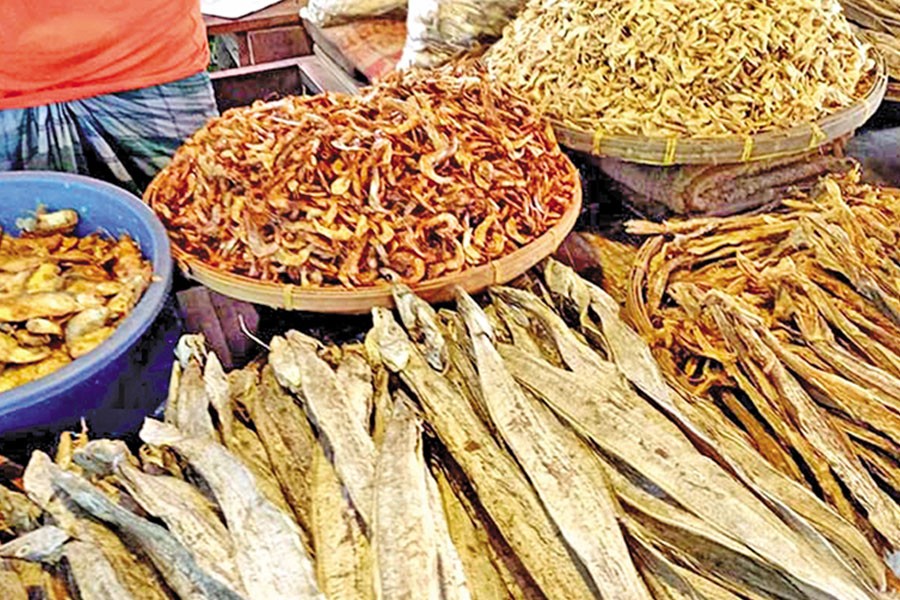
Published :
Updated :

Around 13 per cent of the dried-fish samples have been found contaminated by chemical pesticides, according to latest research findings.
On the other hand, the remaining tested dried-fish samples have been found to be safe.
According to the research, the level of pesticide contamination in dried fish decreases significantly after cooking.
The findings of the research, conducted by a team from the Bangladesh Fish Research Institute (BFRI), were disclosed on Wednesday at a seminar, organised by Bangladesh Food Safety Authority (BFSA) at the Authority's head office in the city.
Chaired by BFSA member Dr Mohammad Mostafa, the event was attended by BFSA Chairman Zakaria as the chief guest.
Dr Md Ariful Islam, Senior Scientific Officer at the Bangladesh Fisheries Research Institute (BFRI), presented the study.
Panel discussions featured Prof Dr Md Tazul Islam Chowdhury from Sher-e-Bangla Agricultural University's Department of Agricultural Chemistry, and Dr Md Nazmul Bari, Principal Scientific Officer at the Bangladesh Rice Research Institute (BRRI).
BFSA member Prof Dr Mohammad Shoeb delivered the welcome address.
According to the research report, the leading production zones of dried marine fish in the country are: Chattogram, Cox's Bazar, and Dublar Char Freshwater dried fish is mainly produced in Chalan Beel (Natore) and Sunamganj.
The study further reveals that people in Chattogram and Cox's Bazar commonly consume Chhuri Shutki or dried ribbon fish with the rate of consumption at 57 per cent in Chattogram and 50 per cent in Cox's Bazar.
On the other hand, people in Chalan Beel mostly consume Taki Shutki (37 per cent), while in Dublar Char of the Sundarbans, the most preferred dried fish is Loittya Shutki or dried Bombay duck fish (46 per cent).
These findings were obtained after analysing a total of 405 samples collected from the five afore-mentioned locations.
BFSA Chairman Zakaria, however, said: "This study is one of seven research initiatives undertaken in 2022-23. The findings presented here are the researchers' own observations".
This is not a nationwide assessment, rather a limited study, he said.
"If alarming levels of pesticide contamination are found in small-scale studies, larger-scale research will be recommended to relevant stakeholders", he said.
He also said, "Using pesticides in dried fish will be treated as a punishable offence."
Dr Mohammad Shoeb said pesticides were being used in dried fish.
"Recently, the Basel Convention proposed banning 10 pesticides, two of which are used in Bangladesh", he said.
Dr Md Ariful Islam said: "About 60 per cent of our protein comes from fish and meat. Most of the dried fish producers in the country are uneducated and lack proper processing knowledge. Dried fish production occurs between October and March, and when sunlight is insufficient, pesticides are often used."
He said pesticides are primarily used when drying fish under sunlight.
Out of 260 tested samples, only 13 per cent showed pesticide residues.
The study found presence of higher levels of endosulfan sulfate in dried fish from Cox's Bazar, Chattogram, Dublar Char, Sunamganj, and Chalan Beel.
Other pesticides like dieldrin, heptachlor epoxide, and beta-endosulfan were detected in a smaller volume.
Dr Md Nazmul Bari said research should be done on widespread use of polythene and also on microplastic analysis.
He also recommended mechanical drying methods over sun-drying.
tonmoy.wardad@gmail.com


 For all latest news, follow The Financial Express Google News channel.
For all latest news, follow The Financial Express Google News channel.